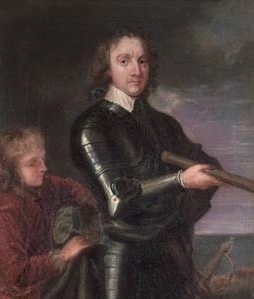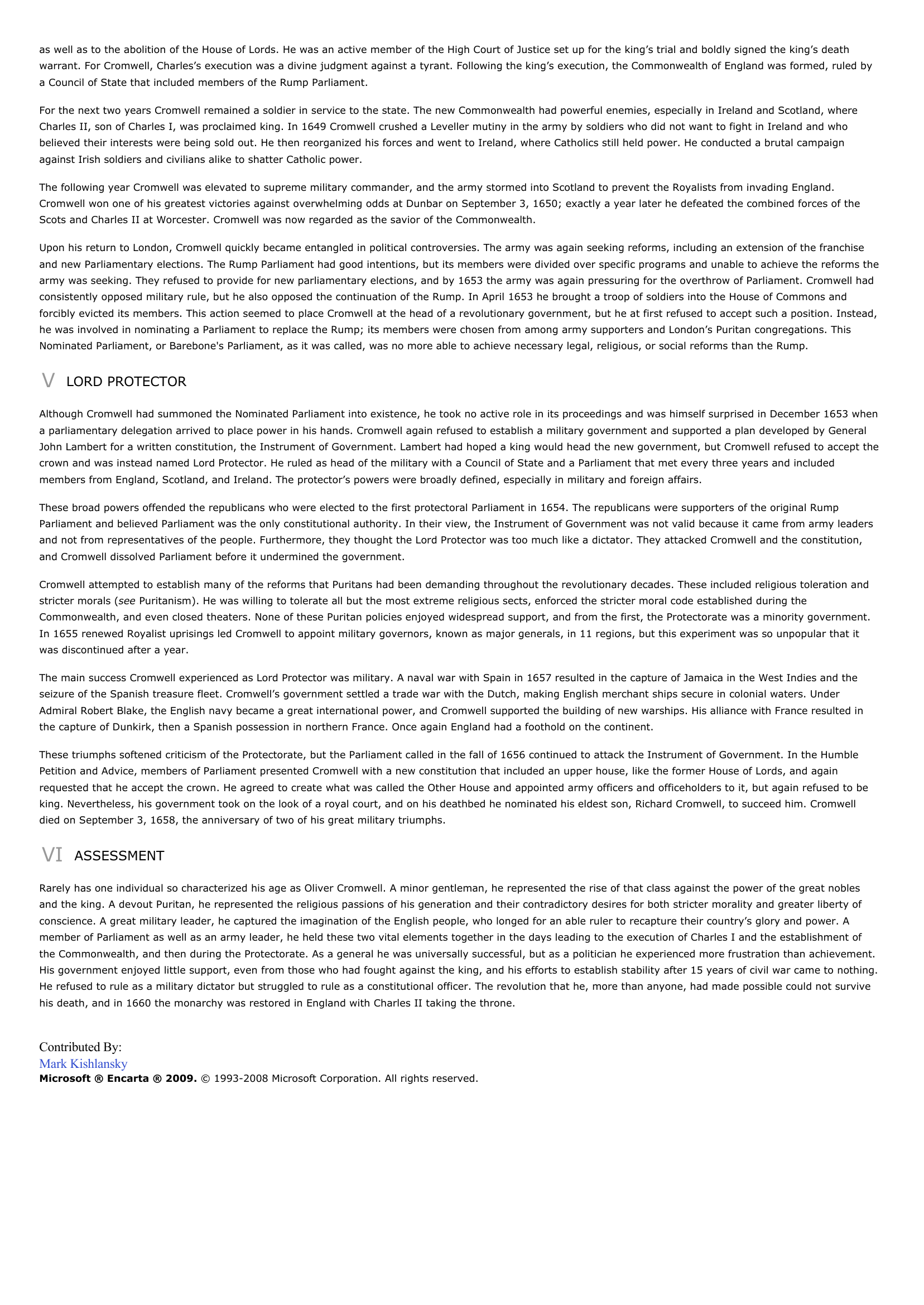Oliver Cromwell I INTRODUCTION Oliver Cromwell (1599-1658), leader in the English Revolution (1640-1660) and the first commoner to rule England.
Publié le 10/05/2013
Extrait du document


«
as well as to the abolition of the House of Lords.
He was an active member of the High Court of Justice set up for the king’s trial and boldly signed the king’s deathwarrant.
For Cromwell, Charles’s execution was a divine judgment against a tyrant.
Following the king’s execution, the Commonwealth of England was formed, ruled bya Council of State that included members of the Rump Parliament.
For the next two years Cromwell remained a soldier in service to the state.
The new Commonwealth had powerful enemies, especially in Ireland and Scotland, whereCharles II, son of Charles I, was proclaimed king.
In 1649 Cromwell crushed a Leveller mutiny in the army by soldiers who did not want to fight in Ireland and whobelieved their interests were being sold out.
He then reorganized his forces and went to Ireland, where Catholics still held power.
He conducted a brutal campaignagainst Irish soldiers and civilians alike to shatter Catholic power.
The following year Cromwell was elevated to supreme military commander, and the army stormed into Scotland to prevent the Royalists from invading England.Cromwell won one of his greatest victories against overwhelming odds at Dunbar on September 3, 1650; exactly a year later he defeated the combined forces of theScots and Charles II at Worcester.
Cromwell was now regarded as the savior of the Commonwealth.
Upon his return to London, Cromwell quickly became entangled in political controversies.
The army was again seeking reforms, including an extension of the franchiseand new Parliamentary elections.
The Rump Parliament had good intentions, but its members were divided over specific programs and unable to achieve the reforms thearmy was seeking.
They refused to provide for new parliamentary elections, and by 1653 the army was again pressuring for the overthrow of Parliament.
Cromwell hadconsistently opposed military rule, but he also opposed the continuation of the Rump.
In April 1653 he brought a troop of soldiers into the House of Commons andforcibly evicted its members.
This action seemed to place Cromwell at the head of a revolutionary government, but he at first refused to accept such a position.
Instead,he was involved in nominating a Parliament to replace the Rump; its members were chosen from among army supporters and London’s Puritan congregations.
ThisNominated Parliament, or Barebone's Parliament, as it was called, was no more able to achieve necessary legal, religious, or social reforms than the Rump.
V LORD PROTECTOR
Although Cromwell had summoned the Nominated Parliament into existence, he took no active role in its proceedings and was himself surprised in December 1653 whena parliamentary delegation arrived to place power in his hands.
Cromwell again refused to establish a military government and supported a plan developed by GeneralJohn Lambert for a written constitution, the Instrument of Government.
Lambert had hoped a king would head the new government, but Cromwell refused to accept thecrown and was instead named Lord Protector.
He ruled as head of the military with a Council of State and a Parliament that met every three years and includedmembers from England, Scotland, and Ireland.
The protector’s powers were broadly defined, especially in military and foreign affairs.
These broad powers offended the republicans who were elected to the first protectoral Parliament in 1654.
The republicans were supporters of the original RumpParliament and believed Parliament was the only constitutional authority.
In their view, the Instrument of Government was not valid because it came from army leadersand not from representatives of the people.
Furthermore, they thought the Lord Protector was too much like a dictator.
They attacked Cromwell and the constitution,and Cromwell dissolved Parliament before it undermined the government.
Cromwell attempted to establish many of the reforms that Puritans had been demanding throughout the revolutionary decades.
These included religious toleration andstricter morals ( see Puritanism).
He was willing to tolerate all but the most extreme religious sects, enforced the stricter moral code established during the Commonwealth, and even closed theaters.
None of these Puritan policies enjoyed widespread support, and from the first, the Protectorate was a minority government.In 1655 renewed Royalist uprisings led Cromwell to appoint military governors, known as major generals, in 11 regions, but this experiment was so unpopular that itwas discontinued after a year.
The main success Cromwell experienced as Lord Protector was military.
A naval war with Spain in 1657 resulted in the capture of Jamaica in the West Indies and theseizure of the Spanish treasure fleet.
Cromwell’s government settled a trade war with the Dutch, making English merchant ships secure in colonial waters.
UnderAdmiral Robert Blake, the English navy became a great international power, and Cromwell supported the building of new warships.
His alliance with France resulted inthe capture of Dunkirk, then a Spanish possession in northern France.
Once again England had a foothold on the continent.
These triumphs softened criticism of the Protectorate, but the Parliament called in the fall of 1656 continued to attack the Instrument of Government.
In the HumblePetition and Advice, members of Parliament presented Cromwell with a new constitution that included an upper house, like the former House of Lords, and againrequested that he accept the crown.
He agreed to create what was called the Other House and appointed army officers and officeholders to it, but again refused to beking.
Nevertheless, his government took on the look of a royal court, and on his deathbed he nominated his eldest son, Richard Cromwell, to succeed him.
Cromwelldied on September 3, 1658, the anniversary of two of his great military triumphs.
VI ASSESSMENT
Rarely has one individual so characterized his age as Oliver Cromwell.
A minor gentleman, he represented the rise of that class against the power of the great noblesand the king.
A devout Puritan, he represented the religious passions of his generation and their contradictory desires for both stricter morality and greater liberty ofconscience.
A great military leader, he captured the imagination of the English people, who longed for an able ruler to recapture their country’s glory and power.
Amember of Parliament as well as an army leader, he held these two vital elements together in the days leading to the execution of Charles I and the establishment ofthe Commonwealth, and then during the Protectorate.
As a general he was universally successful, but as a politician he experienced more frustration than achievement.His government enjoyed little support, even from those who had fought against the king, and his efforts to establish stability after 15 years of civil war came to nothing.He refused to rule as a military dictator but struggled to rule as a constitutional officer.
The revolution that he, more than anyone, had made possible could not survivehis death, and in 1660 the monarchy was restored in England with Charles II taking the throne.
Contributed By:Mark KishlanskyMicrosoft ® Encarta ® 2009. © 1993-2008 Microsoft Corporation.
All rights reserved..
»
↓↓↓ APERÇU DU DOCUMENT ↓↓↓
Liens utiles
- English Revolution I INTRODUCTION English Revolution, also called the Puritan Revolution, general designation for the period in English history from 1640 to 1660.
- Galileo I INTRODUCTION Galileo (1564-1642), Italian physicist and astronomer who, with German astronomer Johannes Kepler, initiated the scientific revolution that flowered in the work of English physicist Sir Isaac Newton.
- Vladimir Lenin I INTRODUCTION Vladimir Lenin (1870-1924), Russian revolutionary leader and theorist, who presided over the first government of Soviet Russia and then that of the Union of Soviet Socialist Republics (USSR).
- John Winthrop: "A City Upon a Hill" In 1629 English attorney and Puritan John Winthrop was chosen by the Massachusetts Bay Company, an English trading firm, to govern its colony in New England.
- Cromwell Oliver, 1599-1658, né à Huntingdon, homme d'État anglais.

































